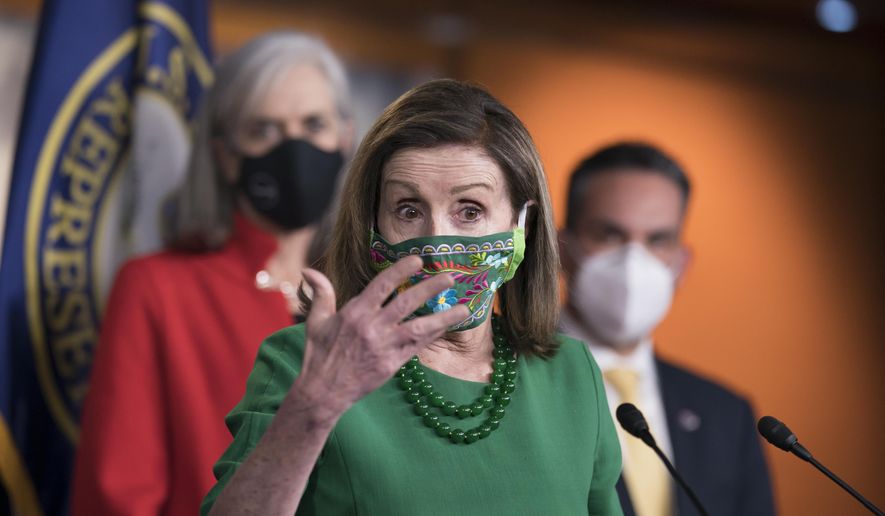The Democratic-led House passed its $1.9 trillion coronavirus relief package early Saturday, powering through the massive spending bill to deliver on President Biden’s top legislative priority of his early days in office.
The vote marks a first step in congressional Democrats’ push to get a bill to Mr. Biden’s desk by mid-March. The legislation now heads to the Senate, where it will almost certainly be amended.
“The time for decisive action is long overdue,” said Speaker Nancy Pelosi of California. “As President Biden has said, help is on the way.”
The House passed the bill 219-212 on a near-party line vote. Two Democrats — Reps. Jared Golden of Maine and Kurt Schrader of Oregon — voted no, and zero Republicans supported the bill.
House Democrats said there’s no time to waste in getting direct checks of up to $1,400 to millions of Americans, approving additional money for vaccines, and shoring up the finances of cash-strapped states, localities and small businesses.
Republicans said they’ve been shut out of the broader negotiating process and that much of the money, including for K-12 schools, isn’t needed or is structured so most of it won’t be spent this year.
“Let me be clear — the swamp is back,” said House Minority Leader Kevin McCarthy of California. “Democrats are so embarrassed by all the non-COVID waste in this bill, they are jamming it through in the dead of night.”
Mrs. Pelosi announced the final vote tally just after 2 a.m.
House Budget Committee Chairman John Yarmuth said it’s “undeniably true” that the bill could be better targeted but said time is of the essence.
“There are people who will benefit who probably could get along without this assistance,” said Mr. Yarmuth, Kentucky Democrat. “Everyone [here] understands how long it takes to set up a need-based operation, no matter what it is. We’d be into the fall or winter of next year before we actually could deliver any assistance if we actually [try] to set up huge bureaucracies and systems that would be needed to do that.”
Democrats kept an increase in the federal minimum wage to $15 per hour in the House package, even though the Senate parliamentarian said this week it would run afoul of that chamber’s rules.
“We will not rest until we pass [a] $15 minimum wage,” Mrs. Pelosi said. “If it doesn’t prevail because of Senate rules, we will persist.”
The Congressional Budget Office concluded that increasing the hourly minimum wage from $7.25 to $15 per hour by 2025 would kill 1.4 million jobs, though it would also lift 900,000 people out of poverty.
The broader bill includes $350 billion for state and local governments, $170 billion for K-12 schools and colleges, and $25 billion for restaurants, which have been among the hardest-hit businesses by coronavirus-related lockdowns.
It includes a $400-per-week boost to unemployment benefits through the end of August. Democrats say they’re rushing to pass the bill before mid-March, when a $300-per-week boost to unemployment checks from an earlier package is due to expire.
The bill also includes expanded food stamp benefits, tax credits for child care, and additional subsidies for people to purchase health insurance if they lost their job during the pandemic.
The House-passed bill will almost certainly have to be amended by the Senate.
The Senate parliamentarian ruled Thursday that a hike in the federal minimum wage to $15 per hour cannot be included under the fast-track budget process Democrats are using to thwart a potential GOP filibuster.
The White House says Vice President Kamala Harris will not use her authority as president of the Senate to overturn the ruling.
Liberal Democrats say the party needs to use every tool at their disposal to muscle a wage hike through — including ousting Parliamentarian Elizabeth MacDonough.
“In two years I don’t think we can go back to voters and say look, I know Republicans, Democrats, and independents support this, we promised it, but because of an unelected parliamentarian who gave us a ruling, we couldn’t do it,” said Rep. Pramila Jayapal, Washington state Democrat. “Nobody’s going to buy that.”
But even before the parliamentarian’s ruling, Senate Democrats lacked the votes to pass a $15 minimum wage, assuming Republicans were unified in opposition.
Democratic Sens. Joe Manchin of West Virginia and Kyrsten Sinema of Arizona said they would not support including a $15 minimum wage in the broader relief package.
Democrats are using the budget process to pass the legislation because under Senate rules, the package can pass on a simple majority vote.
The Senate is split 50-50 between the two parties. Ms. Harris’s tie-breaking vote gives Democrats effective control of the chamber.
But to use the fast-track budget tool, known as reconciliation, Democrats need to stay within the confines of the “Byrd Rule,” a precedent named after the late Sen. Robert C. Byrd of West Virginia that says items passed using reconciliation must be directly tied to the country’s fiscal situation.
Senate Democrats are now eyeing backup plans to the $15 minimum wage, including possibly hiking taxes on companies that don’t pay their workers a certain salary.
Senate Finance Committee Chairman Ron Wyden, Oregon Democrat, said his plan would also provide tax credits to small businesses that pay their employees higher wages.
“While conversations are continuing, this ’plan B’ provides us a path to move forward and get this done through the reconciliation process,” Mr. Wyden said.
Mr. McCarthy dismissed the idea, which Senate Budget Committee Chairman Bernard Sanders of Vermont also said he will pursue.
“I think it’s stupid,” Mr. McCarthy said. “I think it’s a tax increase, and I wouldn’t expect anything else from the progressive Democrats [in] what they’re proposing…what does it have to do with COVID?”
• David Sherfinski can be reached at dsherfinski@washingtontimes.com.




Please read our comment policy before commenting.